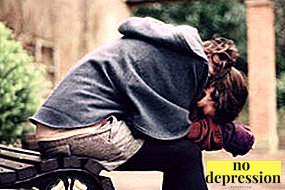From birth to death, we go through 8 stages of development, at each of which we are in for an identity crisis. What is it and what is its danger? What happens to us at specific age intervals? How to help your child survive the tipping point? After reading the article, you will not only find the answers to these questions, but also find out where the rakes are hidden, which can be accidentally stepped on.
What is an identity crisis?
The crisis of identity is the period of formation of a person’s identity through the search for one’s place and role in society, awareness of one’s own uniqueness. Research on this phenomenon belongs to the American psychologist Eric Erickson, who identified eight stages of human psychological development. The transition from one step to another is accompanied by changes in the perception of oneself and the world around us. Most of them occur before the age of 21, but even after this age, values are being re-evaluated. Age limits may change or shift, but the order of the steps remains the same for most.
Trust or not?
A person faces the first crisis in the first year of his life. "Is the world a safe place or a hostile environment for me?" - this is the main question now. The child observes the situation and the people around him, studying how consistent, stable, and benevolent actions are in relation to him.
The most important thing that should happen at the first stage is the emergence of a child’s trust in the world. If you provide your baby with regular care, attention, care, he will feel safe. And this is the guarantee of the harmonious development of the personality. In addition, a trusting relationship with the world will help a person to more gently step over critical thresholds.
Fight for independence
From one to three years, a person goes through the next stage of development, the essence of which consists in the formation of personal independence and opposition to the upbringing of adults. By all means, the child must defend the limits of his autonomy and the right to choose. He seeks to use acquired skills (dressing himself, combing his hair, and so on), persistently improving his skills.
Children who were not limited in the study of themselves or their surroundings, but, on the contrary, supported their desire for independence, have more confidence in themselves. They are ready to defend the borders of their territory, their own opinion, resisting the pressure from outside. Harsh criticism, constant monitoring and reproaches like: "Who do you look like!", "Look what you have done!", "All children are like children, and you are!" raise self-doubt, cause feelings of doubt and guilt. If you prevent the child to declare himself, then in the future he will depend entirely on others.
Initiative or guilt
From three to five years, the self-affirmation phase begins. This is a period of active interaction with children, research of their interpersonal skills and self-organization. A child’s life is now very dynamic - children come up with games, assign roles, take initiative and learn to interact in a team.
If he, feeling safe, can show his organizational skills at this stage, then the door to harmonious maturation will open easily and naturally.
Those parents who are accustomed to criticize, stop or stop in order to prevent danger are at risk of causing guilt to the child. Suppressing the initiative that has arisen, preventing the “flow of questions” and the child’s demand to explain this or that situation, we risk that the child will feel rejected and unnecessary. The feeling of guilt not only suppresses creativity, but also disrupts the process of communicating with others.
For adults, the difficult, but doable task is to balance initiative and natural guilt.
Self-sufficiency versus self-doubt
The period from 5 to 12 years is distinguished by active comprehension of knowledge, when a person learns to read, write and process the received information. Now the source of the formation of a sense of self-sufficiency is not parents, but teachers and comrades. Encouragement, support initiatives, endorsement provide a person with confidence in themselves and their abilities.
Condemnation of initiative or excessive criticism from others provokes the emergence of a complex of complexities, self-doubt. In addition, the sense of inferiority that has arisen on this basis leads to the unwillingness to learn and develop further.
Path to awareness
At the fifth stage we are aged 12 to 21 years. During this period of time, the transition from childhood to adulthood, the smoothness of which plays an important role in the formation of a holistic personality. Now priority is the establishment of a career and personal life. There is a separation from the parents and a careful search for oneself in all spheres of life. Who am I? Where am I comfortable to be? What do I want? These and other issues that cause a psychological crisis, as a result, lead to the definition of their professional and sexual roles.
If at this stage a person does not have enough strength and experience to identify himself, then a confusion of roles may occur. What does it mean? An internally insecure teenager is prone to abrupt experimentation in the search for himself, which are often accompanied by negative consequences. Attempts to rein in his ardor and send him in some direction provoke protest, rebellion, rejection.
Intimacy and love
This stage we pass the fastest, since it is in the interval between 21 and 25 years. The period is devoted to the study of love and your partner. The ability to build long-term trusting relationships, giving, donating, being responsible for another is developing. If it is possible to create a situation of comfort, the person moves to the next level of development of the Ego, successfully surviving an identity crisis.
If for a long time you specifically avoid serious relationships, then there is a risk of getting used to permanent inner loneliness, a depressed state, or self-isolation from the outside world.
Active development
From 25 years old, according to Erickson, a new stage of human development begins, which is the longest since it ends by the age of 65. It is a time to create a family, a career, a transition to the role of a parent, and so on. The level of self-realization in these vital areas determines how successful a person will feel throughout life.
If the goals set at previous stages are not achieved, then there is a probability of a stop on the way to improvement. The feeling of own unproductiveness can drive into a dead end and a deep psychological crisis, slowing down a further period of development.
Wisdom against despair
At the age of 65, we begin to analyze the life we have lived, but we do not stop at her research. At this time, a person wants to see the fruits of his labors and efforts, realizing himself successful. But if instead of a good result, we determine that the past has been lived unproductively, the goals have not been achieved, the plans have not been realized, then there is a chance that depression will come.
If the identity crisis at this stage goes smoothly, the person, having acquired wisdom, will look into the past with a sense of humility, gratitude, fullness. This will make it possible to approach old age and the end of life without fear.
What is a psychological crisis
A psychological crisis is a condition that requires changes in the former pattern of personality behavior. Such turning points occur periodically in the life of every person and are the norm of development. But if an adult has the strength to independently cope with his condition, then children, especially in adolescence, need the support and understanding of adults.
How does the psychological crisis manifest itself?
- negative emotions are hard to control (outbursts of anger, sudden tantrums, etc.)
- causeless unrest or panic
- the feeling of own helplessness, inferiority becomes aggravated
- hard to plan actions and stick to a certain algorithm
- the realization of the mistakes made drives into a dead end from which it seems that there is no way out
7 Tips to Help Teens Survive a Psychological Crisis
- To praise not only achievements, but also aspirations for them
- Encourage initiatives and the desire to defend their own interests
- Treat teen topics of concern seriously, even if they seem frivolous or stupid
- To assist in the discovery of abilities, referring to the idea that each person is talented in his own way
- Show respect for the child's personality, do not impose their views on life
- To cultivate the ability to answer for their actions, thus accustoming to responsibility
- Accept the fact of growing up, give the child the opportunity to find himself, if, of course, it does not harm his health
The identity crisis is the process of finding oneself, which knocks on the doors of every person from time to time. If from the very birth we are provided with comfortable conditions for passing the turning points, then the subsequent visits of the crisis will be met with a smile and open arms. But if this did not happen? Resentment at the past will not give results, but only provoke an internal conflict. It is possible to avoid him by looking around. Some child now needs your support. And, as you know, other people's children do not exist.



